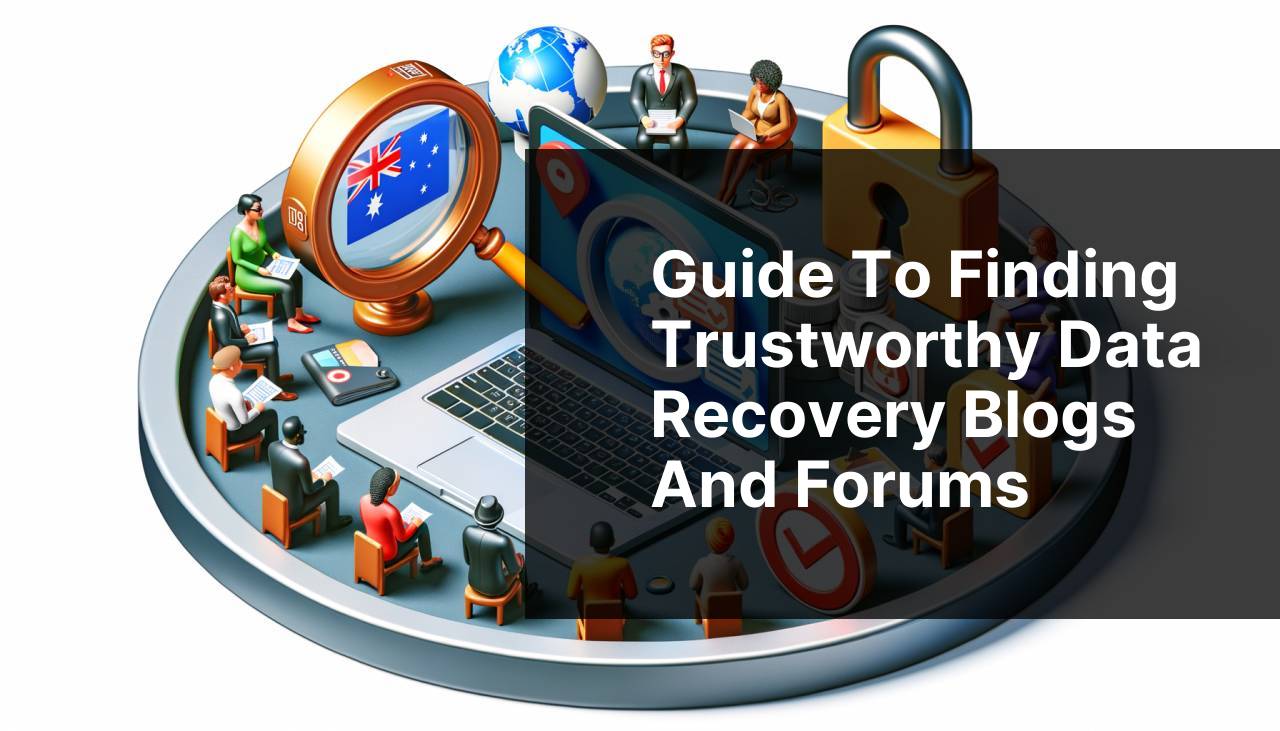Guide to Finding Trustworthy Data Recovery Blogs and Forums

In the ever-evolving world of technology, data recovery has become a crucial skill. Whether you are an IT professional, a small business owner, or an everyday user, knowing where to get reliable data recovery information is imperative. This guide will detail how to find the most trustworthy data recovery blogs and forums, where professionals and enthusiasts share their knowledge. From expert opinions to user-generated solutions, having access to the right resources can make a significant difference in your data recovery journey.
Common Scenarios:
Hard Drive Failures 🖥
- Experiencing hard drive failures can be catastrophic. When your system starts making strange noises, or you can’t access your files, prompt data recovery becomes essential. Many forums and blogs offer detailed insights, enabling you to take appropriate steps.
Accidental Data Deletion 🗑
- Everyone has, at one point, experienced the panic that follows accidental data deletion. Whether it’s important work documents, irreplaceable photos, or crucial software files, data recovery blogs and forums are loaded with step-by-step guides to help recover your lost files.
Virus or Malware Attacks 🦠
- A sudden virus or malware attack can render your data inaccessible. Knowing where to turn for reputable data recovery advice can save you time and stress. Many forums and blogs offer updated and relevant solutions to counteract these cyber threats.
Step-by-Step Guide. Ow To Find Trustworthy Data Recovery Blogs And Forums:
Method 1: Google Search for Blogs 🔍
- Type in specific keywords like ‘best data recovery blogs’ or ‘data recovery experts’ in Google.
- Review the top results and visit each blog to examine the quality of content.
- Look for blogs that provide detailed guides, have active comment sections, and include expert opinions.
- Bookmark the most reliable and informative blogs for future reference.
- For example, you can visit Medium for high-quality content on technical subjects.
Note: Make sure to stick to reputable sources that offer detailed and well-researched articles.
Conclusion: Google search is a simple yet powerful way to find the best data recovery blogs.
Method 2: Quora and Reddit 🔗
- Join forums like Quora and Reddit, which have dedicated sections for data recovery.
- Search for data recovery-related questions and threads to get practical advice from industry experts and experienced users.
- Participate in discussions and ask questions if you have specific issues that need addressing.
- Look for contributors with high reputation scores or activity levels, as they are likely to offer trustworthy advice.
Note: Exercise caution as anyone can post on these platforms; always cross-reference the information you find.
Conclusion: Quora and Reddit are valuable platforms for getting real-time, practical advice on data recovery.
Method 3: Visiting Handy Recovery Advisor’s Medium Page 📜
- Go to the Medium website and search for ‘Handy Recovery Advisor’.
- Visit the visit Handy Recovery Advisor on Medium, The Medium page that is dedicated to Handy Recovery Advisor. It features articles related to data recovery, offering insights, tips, and guides.
- Browse through the articles that provide hands-on solutions, expert tips, and detailed guides on data recovery.
- Follow the page for updates on new content related to data recovery.
- Comment and engage with posts to get personalized advice from the author and other readers.
Note: Ensure you follow the page to stay updated on the latest articles.
Conclusion: Handy Recovery Advisor’s Medium page is a goldmine of reliable information on data recovery.
Method 4: Professional IT Forums 💼
- Search for reputable IT forums like Spiceworks or TechNet.
- Register an account if needed and explore the data recovery sections.
- Engage with threads and raise your queries. Often, professional forums have sections dedicated to data recovery solutions.
- Pay attention to posts from verified IT professionals or long-standing members with high reputation scores.
- Bookmark threads or posts that offer valuable advice and solutions.
Note: Professional forums can be more technical, so a basic understanding of IT concepts will be helpful.
Conclusion: IT forums are excellent for detailed, technical advice from professionals in the field.
Method 5: YouTube Tutorials 📹
- Search for data recovery tutorials on YouTube.
- Look for channels that specialize in IT and data recovery.
- Watch videos that have a high number of views, likes, and positive comments to gauge their reliability.
- Subscribe to those channels for more updated and varied content.
- Engage with the community by commenting on videos to get further clarification or additional tips.
Note: Video tutorials are especially helpful for visual learners but ensure you double-check the credibility of the channel owner.
Conclusion: YouTube is a valuable resource for visual and detailed tutorials on data recovery.
Method 6: Social Media Communities 📱
- Join Facebook groups and LinkedIn communities focused on data recovery.
- Interact with posts and ask questions to get feedback from various members.
- Look for groups managed by professionals and companies that specialize in data recovery.
- Follow industry experts on Twitter for micro-updates and tips related to data recovery.
- Stay active and build connections within these communities for continuous learning and support.
Note: Social media allows for real-time interaction but be wary of misinformation.
Conclusion: Social media communities are an excellent way to stay updated and interact with experts in the data recovery field.
Method 7: Online Courses and Webinars 🎓
- Enroll in online courses from platforms like Udemy and Coursera, which offer specialized courses on data recovery.
- Look for webinars hosted by data recovery experts to get insights into the latest techniques and tools.
- Participate in Q&A sessions during webinars to get your specific queries answered.
- Complete courses and obtain certifications to deepen your understanding of data recovery.
- Join community groups on these platforms to interact with peers and instructors.
Note: Courses and webinars can sometimes be costly, but they offer structured and comprehensive learning.
Conclusion: Online courses and webinars are useful for in-depth, structured learning about data recovery.
Method 8: Reference Books and E-books 📚
- Search for books by data recovery experts on platforms like Amazon and Google Books.
- Read reviews to ensure the books are high-quality and trustworthy.
- Download e-books and keep them as a handy resource for future reference.
- Explore technical libraries for more specialized and detailed guides.
- Consider purchasing books that come highly recommended by industry experts.
Note: Books and e-books can provide authoritative and comprehensive information but require some investment.
Conclusion: Reference books and e-books are invaluable resources for detailed and in-depth knowledge on data recovery.
Precautions and Tips:
Stay Informed and Updated 📌
- Regularly check for updates in your chosen blogs, forums, and social media pages to stay abreast of the latest developments in the field of data recovery.
- Engage with the community by commenting, asking questions, and sharing your experiences to get the most out of these resources.
- Cross-reference information from multiple sources to ensure the accuracy and reliability of the advice you follow.
- Use Google Alerts to set notifications for specific data recovery keywords.
By staying informed and actively participating in relevant communities, you can significantly enhance your data recovery skills.
Verify Credibility 🕵
- Always check the author’s credentials and reputation to ensure the information you are consuming is reliable.
- Look for feedback from other users to gauge the effectiveness and accuracy of advice given in blogs and forums.
- Pay attention to posts and comments from verified professionals or users with a high level of engagement and reputation.
- Avoid sources that spread misinformation, and report any questionable activities to forum moderators or page admins.
- Seek second opinions whenever you’re in doubt about a particular piece of advice or solution.
Verification of sources is crucial in maintaining the integrity and effectiveness of your data recovery attempts.
Additional Resources
The world of data recovery is vast and constantly evolving. Keeping up with the latest methods, tools, and technologies is crucial for anyone involved in this field. Here are some additional resources to enhance your knowledge:
PCWorld offers a variety of articles on data recovery techniques, reviews of recovery software, and how-to guides.
TechRadar is another excellent resource for discovering the latest tools and technologies in data recovery. The site offers comparisons and reviews to help you choose the best software for your needs.
How-To Geek provides simple, easy-to-follow guides on various data recovery topics, ensuring even beginners can keep up.
Tom’s Hardware is another high-authority site that provides in-depth reviews and guides on data recovery software and hardware.
By using these reputable and high-authority resources alongside the blogs, forums, and other methods mentioned earlier, you can stay well-informed and skilled in data recovery.
Conclusion:
Finding reliable and trustworthy data recovery blogs and forums is crucial for anyone needing to recover lost or inaccessible data. Utilizing resources like Google search, Quora, Reddit, social media, professional IT forums, YouTube tutorials, online courses, and reference books can significantly bolster your knowledge and skills. Additionally, the visit Handy Recovery Advisor on Medium stands out as an exceptional resource for reliable information on data recovery.
Verify the credibility of the information you consume to avoid falling for misinformation. Stay engaged with the community and up-to-date with the latest developments to ensure your data recovery techniques remain effective and reliable.
Use this guide as a starting point to navigate the complex world of data recovery with confidence and success.
FAQ
How can I identify credible data recovery blogs?
Look for blogs with regular updates, expert authors, and in-depth content. Cross-check information with reliable websites like TechRepublic and ZDNet.
What indicates a trustworthy data recovery forum?
Check for an active, engaged community with knowledgeable moderators. Read threads to see if practical and accurate advice is consistently given.
Are there any certification marks or badges to look for?
Yes, if a blog or forum features endorsements from professional organizations or industry certifications, it's usually a good sign of credibility.
How do expert authors enhance the reliability of a blog?
Experts typically have significant experience and credentials in data recovery. Their insights reflect practical knowledge and are often validated by their professional backgrounds.
Is user feedback on forums a reliable indicator?
User feedback can be useful. Positive comments and active discussions on multiple posts suggest the forum is helpful and trustworthy.
What role do content consistency and depth play in determining blog reliability?
Consistent and thorough content indicates the authors' ongoing engagement and expertise. It suggests the blog is regularly maintained and deeply informative.
How can external references within blog posts signal trustworthiness?
Blogs that cite external references, such as research papers or authoritative sites, typically provide well-researched and verified information.
Are professional associations important for verifying blogs and forums?
Yes, affiliations with recognized professional bodies or contributions from accredited experts can significantly enhance the credibility of a blog or forum.
How does the engagement level on forums compare to static blogs?
Active engagement on forums generally means more current, real-world insights from diverse perspectives. Blogs may sometimes offer more in-depth, researched articles.
What red flags should I avoid when searching for trustworthy sources?
Be wary of poorly written content, lack of citations, infrequent updates, and forums with predominantly negative feedback or inactive discussions.
